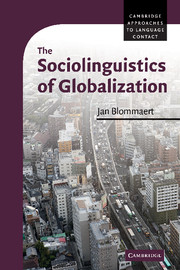Book contents
- Frontmatter
- Contents
- List of illustrations
- Series editor's foreword
- Preface
- Acknowledgements
- 1 A critical sociolinguistics of globalization
- 2 A messy new marketplace
- 3 Locality, the periphery and images of the world
- 4 Repertoires and competence
- 5 Language, globalization and history
- 6 Old and new inequalities
- 7 Reflections
- Notes
- References
- Index
Series editor's foreword
Published online by Cambridge University Press: 05 June 2012
- Frontmatter
- Contents
- List of illustrations
- Series editor's foreword
- Preface
- Acknowledgements
- 1 A critical sociolinguistics of globalization
- 2 A messy new marketplace
- 3 Locality, the periphery and images of the world
- 4 Repertoires and competence
- 5 Language, globalization and history
- 6 Old and new inequalities
- 7 Reflections
- Notes
- References
- Index
Summary
The series Cambridge Approaches to Language Contact (CALC) was set up to publish outstanding monographs on language contact, especially by authors who approach their specific subject matter from a diachronic or developmental perspective. Our goal is to integrate the ever-growing scholarship on language diversification (including the development of creoles, pidgins, and indigenized varieties of colonial European languages), bilingual language development, code-switching, and language endangerment. We hope to provide a select forum to scholars who contribute insightfully to understanding language evolution from an interdisciplinary perspective. We favour approaches that highlight the role of ecology and draw inspiration both from the authors' own fields of specialization and from related research areas in linguistics or other disciplines. Eclecticism is one of our mottoes, as we endeavour to comprehend the complexity of evolutionary processes associated with contact.
We are very happy to add to our list Jan Blommaert's The Sociolinguistics of Globalization, an authoritative invitation to rethink linguistic communication in a world that has become increasingly interconnected, is marked by more and more mobility of both people and commodities (including language) as well as by socio-economic inequities, and is undeniably polycentric. Some hegemonic languages, chiefly English, have spread world-wide but have not only become ‘global’ but also indigenized, both adapted to new communicative habits and subjected to local norms. Consequently, their market values are not universally identical across national borders; in fact, not even within the same borders. It is more and more a question of whose English it is and where it is spoken.
- Type
- Chapter
- Information
- The Sociolinguistics of Globalization , pp. xi - xiiPublisher: Cambridge University PressPrint publication year: 2010
- 2
- Cited by

